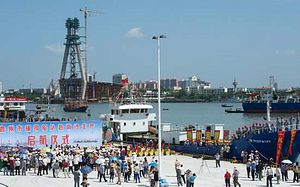China is pursuing a special type of hybrid warfare in the South China Sea. Similar to Russia’s “Little Green Men” during Moscow’s takeover of Crimea, China has been deploying “Little Blue Men” in the maritime domain to harass Beijing’s adversaries in the South China Sea and to press its territorial claims.
That’s at least how U.S. military analyst Andrew Erickson describes the irregular maritime forces–government-controlled fisherman–that China is using to pursue its national interests in the Western Pacific, in an interview with Defense News.
“China is trying to use these government-controlled fisherman below the radar to get the bonus without the onus to support its South China Sea claims,” Erickson noted. “It’s a phenomenon little-known or understood in the U.S.”
“While Russia’s little green men in Crimea are widely known, insufficient attention has been paid to China’s little blue men in the South China Sea,” he added. “It’s so different from what the US does. People aren’t familiar with it, it’s hard to wrap their heads around it.”
During the recent South China Sea transit of the U.S. destroyer USS Larsen, the People’s Liberation Army Navy vessels behaved professionally. However, according to a U.S. Navy source, “there were Chinese merchant vessels present that were not as demure as the Chinese Navy. One came out of its anchorage in the island and crossed the destroyer’s bow but at a safe distance, and the Lassen did not alter course as the merchant ship circled around.”
Rather than ordinary fishermen, these Chinese vessels were in all likelihood part of China’s maritime militia, whose members often, in fact, wear uniforms. In a recent article, Erickson quotes the People’s Liberation Army’s official newspapers, which states that “putting on camouflage they qualify as soldiers, taking off the camouflage they become law abiding fishermen.”
According to Erickson, “China’s trying to have it two ways here.” Given that the U.S. Navy’s rules of engagement are likely to be different when dealing with a fishing vessel rather than a warship Beijing “is trying to use these maritime militia forces to put it in a position that frustrates us in our ability to respond.”
China’s fishing fleet consists of 200,000 vessels, the largest in the world, and its commercial fishing industry employs around 14 million workers. China’s maritime militia, founded in 1949, recruits its members from this large reservoir of people. Within the militia, the China Coast and PLAN is training a select group of elite militiamen to oppose foreign naval forces. Erickson explains:
The majority of maritime militia are less elite, do more mundane transport, crewing, repair, coastal patrolling, and emergency response. But there is a small elite that is better manned, trained and equipped. They are developed to support those more advanced types of missions. Which include, theoretically, some wartime capabilities.
As James Kraska noted in an August 2015 piece for The Diplomat, Beijing’s maritime militia can also be employed to gather intelligence:
The fishing vessels of the militia are equipped with advanced electronics, including communications systems and radar that supplement the PLAN force structure and enhance interoperability with other agencies, such as the China Coast Guard. Many boats are equipped with satellite navigation and can track and relay vessel positions, and gather and report maritime intelligence.
Similar to Russia’s “Little Green Men,” China’s “Little Blue Men” are most successful when the element of surprise is on their side, according to Erickson:
These forces have their greatest power when they’re least known, least anticipated. The more we can call them out to foresee their presence and actions in advance, the more power we can take away from them. These are forces with rather limited capabilities overall. And if they’re exposed as militia that answer to the PLA chain of command it can be seen in a different light.
Erickson is particularly concerned that China, by having it both ways, is exploiting existing military-to-military exchanges:
There’s a potential problem whereby China’s Navy is bear-hugging the U.S. Navy to learn more about our best practices, talking the talk of a good cop, while the bad cops — the Coast Guard and maritime militia — are doing the dirty work in the East China Sea and the South China Sea.

































